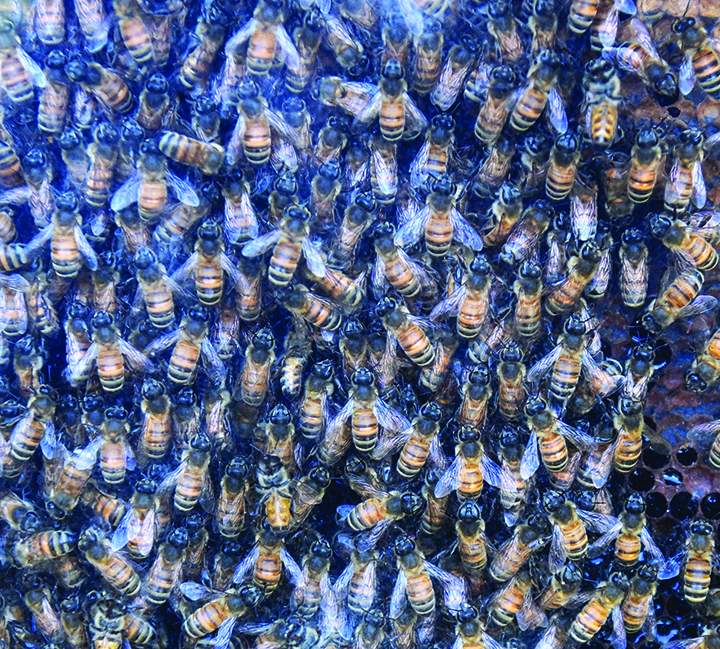Eight-week beginners beekeepers class starts Feb. 24; ‘bee’ part of the pollination process
CAPE MAY COURT HOUSE — Sorry for the pun, but if you want to learn what the buzz is all about this late winter and spring, sign up for the Beginners Beekeeping Workshop starting Feb. 24 at the Rutgers Cooperative Extension office.
Becoming a beekeeper will help keep the garden in the Garden State by promoting pollination. The hobby itself is quite a bit of fun, according to members of the Jersey Cape branch of the New Jersey Beekeepers Association, which is putting on the workshops in conjunction with Rutgers Cooperative Extension.
“Most of us think it’s fun, but also for educational purposes,” said Fred Steinman of Egg Harbor Township, president of the Jersey Cape branch. “It’s a hobby but we think it’s fun. It’s a great learning experience. You can pollinate your own garden. It helps with your vegetables. It helps neighbors with their plants.”
“Bees pollinate at least a third of all the food that we eat. Without the honeybees, we’ll have a lot less food out here,” Steinman said.
He has been keeping bees about 12 years and now has 18 hives.
“I’ve always been interested in bees and once when I was a police officer, I actually saw a swarm on the side of a tree. That got me really interested in it, but (at the time) I had family that was allergic to bees,” he said. “Finally, I said, ‘Forget that, I’m getting bees.’ And they’ve been there ever since.”
“I love it,” said Debbie Morey of Upper Township, treasurer of the branch. “I sit out and watch my hive all the time. To watch what goes on with the hive is fascinating. There are certain dances that they do to let them know where the food is and how far away it is. And in the fall you watch the girls dragging the drones out and throwing them out of the hive.”
“They don’t need to be feeding them because the drones — us guys — they just sit around like couch potatoes,” added her husband, Dan. “They don’t need to be taking care of them during the winter so they get rid of them.”
The Moreys keep two hives.
“We’ve been in it 11 years now,” Dan Morey said. “My wife said I needed a hobby. I took the course and started from there.”
The New Jersey Beekeepers Association wants people aware of honeybees.
“Being the Garden State, it is really important,” Debbie Morey said. “There are over 2,000 beekeepers in New Jersey. They’re everywhere you don’t realize they are,” she said, laughing.
“There are state regulations about size of property, but people keep them on rooftops, on decks, wherever. I have one hive right outside my door by the deck so I can watch them come and go. I have one in the backyard.”
“Our main goal is education of the public about the perils facing honeybees as well as supporting each other,” she said, noting members of the association can have as few as one hive or as many as they want.
The Moreys and Steinman are hobbyists, unlike beekeepers who do it as a business venture and take their hives around, as far as Florida, to help pollinate orchards or closer by, to blueberry fields.
“There are quite a few who offer pollination services for a fee,” Steinman said.
He noted that the amount of honey his 18 hives produces changes depending on the weather and “how strong the bees are.”
“For me in Egg Harbor Township, in (2022) we had such hot weather and lack of rain, the bees didn’t produce enough honey for me to even extract. The bees come first. They need at least 60 pounds in the winter to survive. If you don’t leave them that much, they potentially could starve.”
He said he got about 450 pounds of honey the prior year.
“Sometimes you have to put some honey into the smaller hives so they can survive. With me … I make sure everyone has enough, then I’ll extract for me,” he said, adding if there is enough of a surplus, some can be sold.
Dan Morey said most of the honey their hives produce goes to family and friends.

Eight-week course, with or without bees
The eight-session course runs consecutive Friday evenings and will include “everything from bee biology and pest management through hive construction and the installation of bees.”
Depending on how much you want to spend and how serious you are about beekeeping, there are different levels.
The registration fee for the course itself is $100.
To purchase a five-frame nuc (or nucleus) of bees is $200 for a total of $300. To add the wooden ware for the hive (a starter kit) costs $200. So, for $500 total, you come out of the course with the knowhow, the equipment and the bees. If an additional family member wants to take part in the course, it is an extra $55. (A nice couples or family activity?)
The course runs from 7 to 9:30 p.m. Fridays, Feb. 24 though April 14, at the cooperative extension offices at 355 Court House-South Dennis Road in Cape May Course House.
There are two prerequisites for getting a Certificate of Completion, required attendance for two specific sessions and allowance for one missed session.
The bees will arrive in April. There is a separate fee to join the Beekeepers Association.
To get a registration form, email moreyzoo@comcast.net.
Jerry Futrell is coordinator for the class. Email him at futrell@1791.com or call (609) 425-3707 for more information.
By DAVID NAHAN/Sentinel staff



